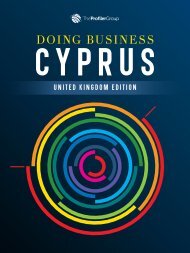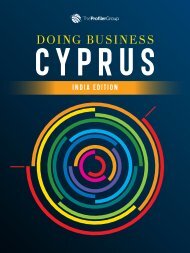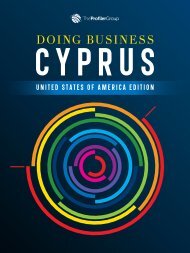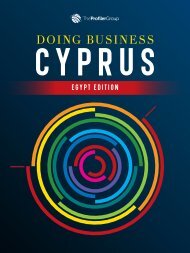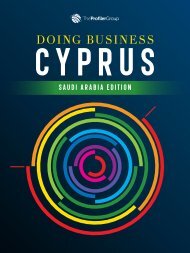2020 Cyprus Country Report
The 2020 Cyprus Country Report features in-depth articles on the economy, foreign direct investment, international trade and headquartering as well as detailed sector profiles and insights from Cyprus’ 100 most influential political, economic and business leaders shaping the future of their country and its industries.
The 2020 Cyprus Country Report features in-depth articles on the economy, foreign direct investment, international trade and headquartering as well as detailed sector profiles and insights from Cyprus’ 100 most influential political, economic and business leaders shaping the future of their country and its industries.
Create successful ePaper yourself
Turn your PDF publications into a flip-book with our unique Google optimized e-Paper software.
Agriculture & Food<br />
Sector Profile<br />
ucts constituting around 40% of total raw agricultural<br />
products. They get their winning flavour<br />
from the distinctive potassium-rich red soil of<br />
<strong>Cyprus</strong>. Around 96% of potato exports are to the<br />
EU, with main markets being Greece, the UK and<br />
Germany.<br />
Today, there is less cultivation of various<br />
types of citrus fruit. Exports of these were hit<br />
around a decade ago after the EU reduced tariffs<br />
on imports of citrus from third countries in the<br />
Mediterranean such as Morocco, Egypt and<br />
Turkey – where labour costs are far lower and<br />
production volume significantly greater. Farmers<br />
dedicated to citrus were encouraged to shift to varieties<br />
that perform well in export markets, such<br />
as the tango orange and lemons. Government incentives<br />
are also in place to substitute citrus trees,<br />
which require a lot of irrigation and expensive<br />
pesticides, with hardy crops that naturally thrive<br />
in dry climates, such as vitamin-rich fruit like<br />
pomegranates and prickly pears. The medicinal<br />
oil from the seeds of prickly pears can sell for up<br />
to €40,000 a litre, proving that developing these<br />
types of fruit can be a highly specialised and lucrative<br />
business. In addition, aloe vera cultivation<br />
holds much potential in making beverages, skin<br />
lotions and cosmetics.<br />
Demand for such products in niche export<br />
markets is steadily rising because of the increased<br />
interest in well-sourced, nutritious food and the<br />
growth of European vegetarian and vegan communities.<br />
<strong>Cyprus</strong> has a clear advantage as many<br />
of these foods come from hardy plants that thrive<br />
in <strong>Cyprus</strong>’ climate and wider cultivation of such<br />
crops will help to address the challenge of water<br />
scarcity. Farmers have enjoyed greater water security<br />
in recent years thanks to the latest desalination<br />
and recycling technology. Also, many of<br />
these crops do not require large land holdings,<br />
which again suits <strong>Cyprus</strong> where around 90% of<br />
holdings are under five acres and most farms are<br />
owned and run by individual families.<br />
For centuries, olive oil has been hailed for its<br />
health benefits and one Cypriot farm has taken<br />
cultivation to the next level, garnering worldwide<br />
attention for its oil. The positive effects come from<br />
the number of phenolic compounds, and Atsas<br />
olive oil has by far the highest number of these<br />
compounds ever recorded worldwide. The oil,<br />
which is exported to Russia, Canada and the US,<br />
has attracted the attention of the scientific world<br />
who are researching the benefits of high phenolic<br />
olive oil in lowering cholesterol and combatting<br />
cancer. California’s UC Davis research institute is<br />
now running clinical tests in the anti-inflammatory<br />
effects of the oil, and the University of Athens<br />
school of pharmacology started clinical tests on<br />
Alzheimer’s. More recently, the prestigious Yale<br />
University announced its interest in researching<br />
the Cypriot oil. The philosophy of the organically<br />
certified Atsas farm is to use agroecology<br />
design to create agricultural systems which have<br />
the diversity, stability and resilience of a natural<br />
ecosystem. The idea is part of the new regenerative<br />
agriculture movement which is gathering momentum<br />
around the world, and the <strong>Cyprus</strong>- olive<br />
oil producer is a pioneer in the field.<br />
Innovation has helped revitalise traditional<br />
minor crops, or ones that were set aside by the<br />
advent of high-intensity cropping systems.<br />
For instance, a current joint effort spearheaded<br />
by the University of <strong>Cyprus</strong> (UCY), the<br />
Agricultural Research Institute (ARI) and the<br />
Central Chemistry Laboratory, is screening the<br />
indigenous carob genetic resources and developing<br />
food, beverages and medicinal products<br />
of high added value. Once dubbed ‘black gold’,<br />
but gradually abandoned over the decades,<br />
carobs are making a strong comeback. Under the<br />
UCY project, 6,000 carob trees were planted in<br />
November 2017, with another 34,000 to follow<br />
on land leased from the forestry department<br />
in Orites, Paphos, for what will be the island’s<br />
biggest organic carob plantation.<br />
52 <strong>Country</strong> <strong>Report</strong> CYPRUS <strong>2020</strong>




